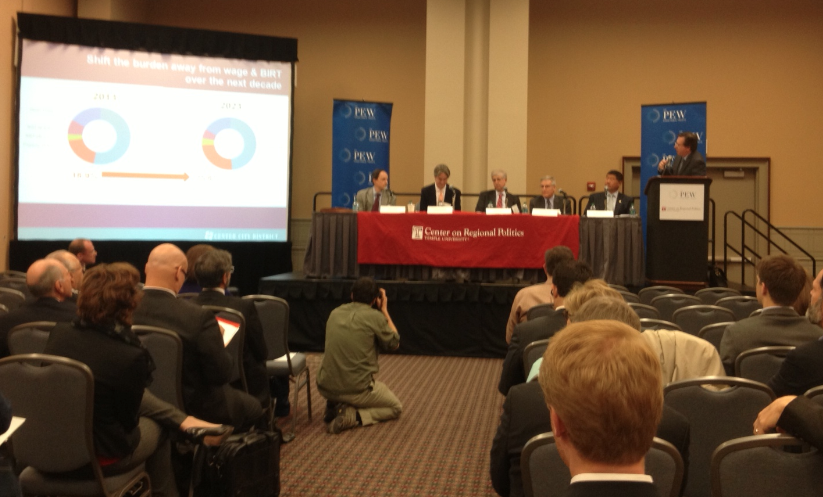Since the post-industrial pre-dawn of 1970, the big U.S. Northeast success cities of record have seen double digit growth in workforce.
In that 40 year span, D.C. employment has jumped by a quarter, Boston by 18 percent and New York City by nearly 15 percent. In stark contrast, Philadelphia has seen a decline — for every four jobs here in 1970, one has disappeared.
If all those cities have had their problems with public education, poverty, crime, blight and gentrification, like Philadelphia, maybe all this hand-wringing about this city’s tax structure is worth the focus.
That was one big idea that was discussed throughout a pair of panel discussions paired together as a symposium on Philadelphia taxes held Friday in partnership between the Pew Charitable Trusts and the Center for Regional Politics at Temple University.

That stark data and the extrapolated tax blame were from Center City District CEO Paul Levy, who was just one of five panel members and not the moderator, but took to clicking through slides throughout the discussion nonetheless.
“I want to direct our attention to this slide again,” Levy would interject.
The factors for Philly lagging behind its neighbors are varied — and likely historically rooted — but panelists seemed to focus heartily on what you’ve heard before: Philadelphia relies famously more on wage than property taxes than other cities.
So low property taxes has made Philadelphia more competitive regionally, but the move to taxing more on property is necessary, particularly now that, as a recent report has shown, development-focused abatement had its major impact already. (It can go wrong at the other extreme — as Baltimore is experiencing, as its high property taxes are the problem there.)

So, as has become the most common reference throughout Philadelphia tax discussions, Philadelphia needs to continue to move toward taxing most heavily on what can’t move (property) and not what can (businesses, wage and sales).
Other big takeaways we spotted:
- Putting jobs beyond the reach of easy mass transit reinforces poverty: Paul Levy, as many of those in poverty are without cars. Jobs in the transit corridor of the city and its nearest environs create broader access.
- One-off tax breaks pick winners and are based on bets for growth industries, said Levy. So though software or video game business or incentive exceptions are interesting, it’s better to lower the rate overall, he argued.
- Philly is good incubating new ideas, but when they scale to production, they leave and we don’t capture the “payoff:” said Wharton’s Robert Inman. He was talking about the Science Center and it seemed to suggest the spinoff of university talent and Exit Interview reality.
- Economists love property taxes because they tie services (schools, environment, real estate value) to cost, and houses don’t move, said Inman.
- Cities are in a marketplace, said Inman. If you offer $1.10 of service for $1 of tax, I’m in. If less, no. So in this competitive environment of attraction and retain, this matters.
- We should look at the PILOT program that is so celebrated in Boston, said Inman, which encourages universities and nonprofits to make payments to cover the city services they use, while retaining their tax-free status. Tang, of the university-backed Science Center, cautioned to think about the many ways these big schools give back: police forces, job creation, etc.
- Despite big job gains in Boston, DC and NYC that Philly hasn’t, those public schools aren’t regarded as much better, said Levy, so taxes are the culprit.
- ‘Revenue neutral’ is a political phrase to avoid controversy, said economic adviser Joel Naroff. The city’s major property tax reassessment shouldn’t be revenue neutral but should actually seek more revenue from property taxes to move forward with the balance re-structuring between property and wage taxes, said Inman, who joked that as a tenured professor he could make such an unpopular claim.
- The City of Philadelphia has 17 different taxes, excluding other local fees and licenses. This contrasts to seven in Boston, according to Tom Ginsberg from Pew.
- Just six of the country’s 30 largest cities have property, sales and income tax, said Ginsberg. Philadelphia is one of them.
What’s next for tax reform?
In addition to the on-going Actual Value Initiative for property taxes, in July 2014, wage and sales tax rate cuts are due to resume and later next year other tax exemptions for startup businesses, among other changes, are due.
Read more from the Philadelphia Citypaper and NewsWorks and Next City.
Find video of the event here.







